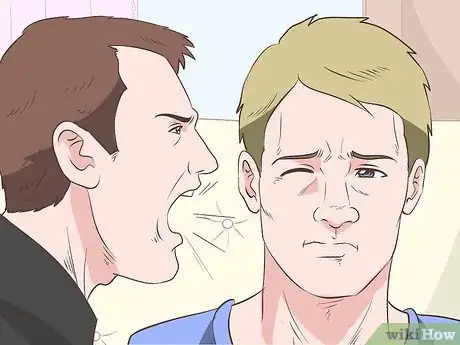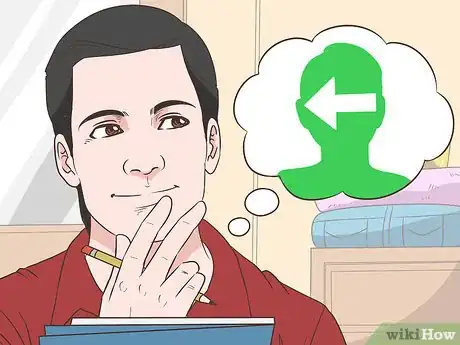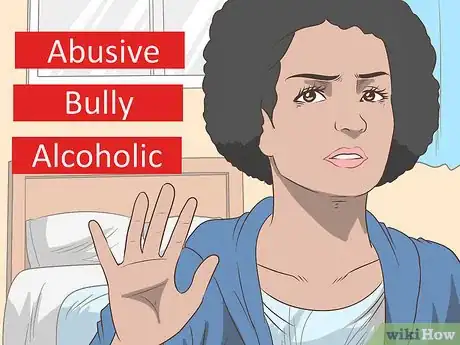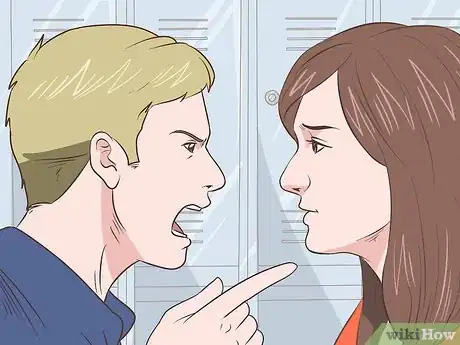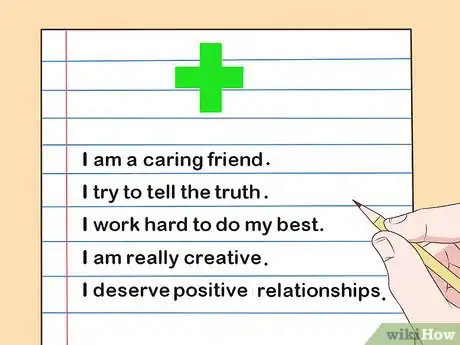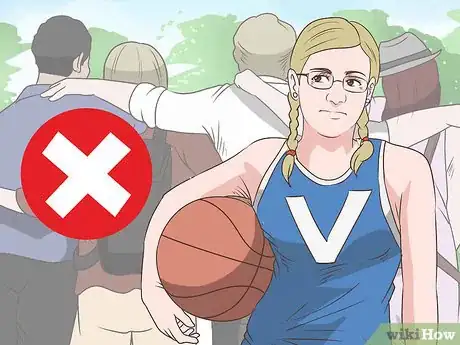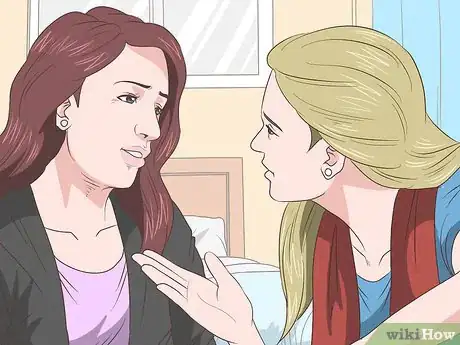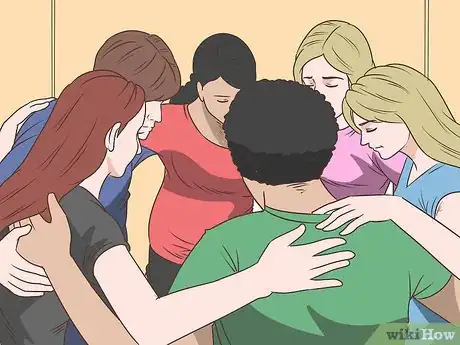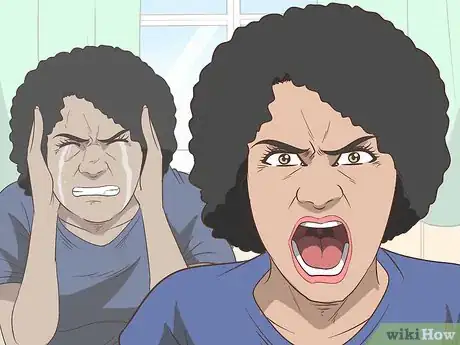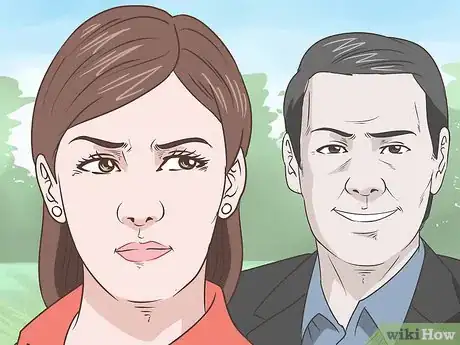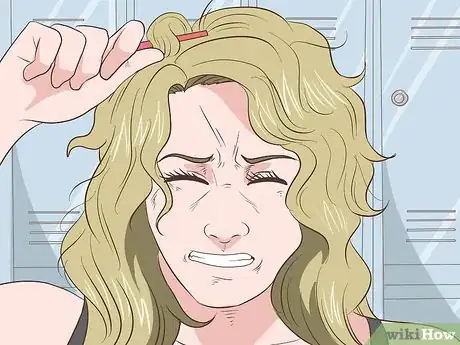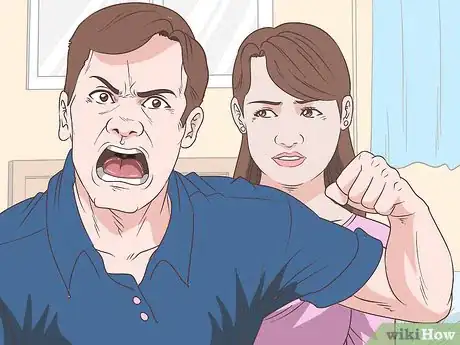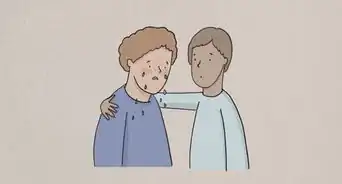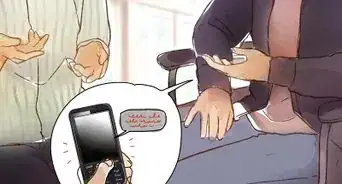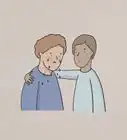This article was co-authored by Adam Dorsay, PsyD. Dr. Adam Dorsay is a licensed psychologist in private practice in San Jose, CA, and the co-creator of Project Reciprocity, an international program at Facebook's Headquarters, and a consultant with Digital Ocean’s Safety Team. He specializes in assisting high-achieving adults with relationship issues, stress reduction, anxiety, and attaining more happiness in their lives. In 2016 he gave a well-watched TEDx talk about men and emotions. Dr. Dorsay has a M.A. in Counseling from Santa Clara University and received his doctorate in Clinical Psychology in 2008.
There are 11 references cited in this article, which can be found at the bottom of the page.
This article has been viewed 35,318 times.
Experiencing emotional or verbal abuse is difficult for anyone, particularly if they are already depressed. Abuse victims can begin to believe that what the abuser says about them is true, or that they deserve the mistreatment. However, the opposite is true. You can deal with abuse you receive by standing up for and protecting yourself, by getting support from others and by understanding that it’s not about you.
Steps
Protecting and Standing Up For Yourself
-
1Learn to identify emotional abuse. If you are not sure if what you are experiencing is emotional abuse, then take a moment to consider how you are being treated or talk it over with someone you trust. Emotional abuse may involve yelling, humiliation, threats and isolation, exclusion, and even denying that abuse is taking place at all.[1]
-
2Identify how you want to be treated. You probably have a general idea of how you would like to be treated by others. As you try to recover from depression and emotional/verbal abuse, it's important that you enforce these boundaries so that you can adequately heal. You will have a hard time recovering if those around you continue to treat you inappropriately. Use your intuition to help you identify the way you want other people to treat you.
- Observe your interactions with those closest to you for a matter of days or weeks. Pinpoint interactions that make you feel good and valued. Make a list. This will help you determine who you may want to keep around and who you may want distance from.
- For example, your list might include "having someone to truly listen to me" and "having others show concern for my well-being."
Advertisement -
3Decide on your deal breakers. Hearing negative things about yourself and being treated poorly can take a negative toll on anyone, particularly someone who already suffers from depression. Think about what behaviors and actions you will not tolerate. Be firm in your decision, as backing down just once can have huge implications and encourage the abuser to continue with the behavior.
- For example, you may tolerate the person talking about their emotions, but you may decide it’s enough if they call you names or blame you for their bad behavior.[2]
-
4Speak up for yourself. The sad truth is, some people believe they deserve to be abused. This is especially so with those who are already depressed. However, no one should experience this type of treatment. Telling the person to stop and vocalizing your displeasure over the situation shows them that you aren’t willing to tolerate the behavior any longer.
- For instance, you could say, “I won’t allow you to abuse me in this way any longer. I will end the relationship if you continue to call me names, blame me for things, or control me.” Again, don’t falter in your decision. Allowing the abuser to slip just once can make the situation continue.[3]
-
5Use positive self-talk to combat abuse. It’s human nature to believe bad things about yourself, especially if you are depressed. You don’t deserve the way you are treated, no matter how they may try to convince you otherwise. Start using positive language to describe yourself to counteract their abusive statements.[4]
- Make a list of your positive attributes to keep handy. When you hear yourself playing into what the abuser says, repeat the list aloud.
- Positive self-talk may sound like "I am a caring friend. I try to tell the truth. I work hard to do my best. I am really creative. I deserve positive relationships."
-
6Leave, if you are able. Your mental health may become worse if you stay in an emotionally or verbally abusive relationship. Your best course of action may be to escape the situation altogether. You leaving may help the abuser to finally realize that what they are doing is wrong. In fact, they might not even be aware that they are doing something wrong. It may take them a very long time have a change in perspective and then begin to behave differently, and this may never happen at all.
- This may mean cutting ties with family members, friends, jobs, and romantic partners. However, for the sake of your well-being, it may be what needs to be done.[5]
- If the abuser is a partner or friend, you might say "I will no longer tolerate being treated this way. I cannot stay in this relationship/friendship any longer."
- To a family member, you might say, "Spending time with you makes me feel terrible about myself. Therefore, I am going to stop coming around. I would appreciate it if you respected my need for space."
Getting Support
-
1Talk to family and friends about the situation. Hopefully you already have a strong support system around you because of your depression. These are the same people you can talk to about your abusive situation. They may be able to offer you advice and refuge from the relationship.
- Be as open and honest about the situation as possible. Also ask them to alert you of any changes in your behavior, as you may need to seek mental health help if the abuse is causing your depression to worsen.[6]
-
2Consult with your therapist or doctor. Tell your mental health professional about the abuse you’re experiencing. They may be able to offer suggestions on how to cope or give you advice about how to leave the situation. The professional may also need to adjust your depression medication or the type of therapy you receive to counterbalance the effects of the abuse.
- Make sure to talk about any negative or suicidal feelings you have. Hiding your emotions from them could cause compromise your health.[7]
-
3Join a support group. Talking to others about your experience can help, whether you’re still enduring the abuse or are trying to recover from its effects. Being around those who have gone through it as well can help you understand that you are not alone and never deserved the treatment. They can also give you suggestions about ways to handle the abuser and how to heal.[8]
Understanding that It’s Not About You
-
1Find out if abuser was a victim of abuse. Those who are abuse victims often continue the cycle by abusing others. Their behavior likely has little to do with you and is mostly caused by their past. They may not know any other way than what they are doing.
- Suggest that the person abusing you seek professional help. You likely know how helpful talking to someone can be, as you may do it yourself because of your depression. Therapy may help this person heal from their past and stop the abuse.[9]
-
2Determine if they crave power. People who feel overlooked or weak in certain areas of their lives may feel the need to seek power and control in others. The feelings that are created during the abuse may give this person the ego boost they need in order to handle feeling unrecognized in other aspects of their life.
- For example, if the abuser is talked down to by their friends, never gets a promotion at work, or is treated poorly by their family, they may look to you as their source of power. Abusing and having control over you may be compensation for not receiving the treatment they feel they deserve.[10]
-
3Take note of any mental illness the abuser might have. You likely understand how having poor mental health can take complete control over your life, as a person with mental illness yourself. Someone who has a mental illness may not realize that what they are doing is inappropriate or may not be able to handle their emotions. By no means does this mean what they are doing is right, but it may not be something they can help.
- Those with anger management issues are often unable to control their explosive emotions and can take it out on others in the form of abuse. Additionally, people who have drug or alcohol problems may resort to abuse because they aren’t capable of handling how they feel.[11]
-
4Examine the abuser’s self-esteem. Abusers are often insecure. They may feel jealous of the person they abuse and exhibit the horrible behavior to make that person feel just as bad as they do. They may also do it because they feel it’s the only way to keep the person near them.
- For instance, in domestic relationships, the abuser may feel so badly about themselves they fear their partner is going to leave them. They exhibit mental and emotional abuse as a way to control the partner and ultimately stop them from seeing other people and potentially leaving them.
- Try having friends and family who witness the abuse mention to the abuser that what they are doing is not okay. This will help to make them more aware of how they are behaving.
Expert Q&A
-
QuestionWhy do people emotionally abuse?
 Adam Dorsay, PsyDDr. Adam Dorsay is a licensed psychologist in private practice in San Jose, CA, and the co-creator of Project Reciprocity, an international program at Facebook's Headquarters, and a consultant with Digital Ocean’s Safety Team. He specializes in assisting high-achieving adults with relationship issues, stress reduction, anxiety, and attaining more happiness in their lives. In 2016 he gave a well-watched TEDx talk about men and emotions. Dr. Dorsay has a M.A. in Counseling from Santa Clara University and received his doctorate in Clinical Psychology in 2008.
Adam Dorsay, PsyDDr. Adam Dorsay is a licensed psychologist in private practice in San Jose, CA, and the co-creator of Project Reciprocity, an international program at Facebook's Headquarters, and a consultant with Digital Ocean’s Safety Team. He specializes in assisting high-achieving adults with relationship issues, stress reduction, anxiety, and attaining more happiness in their lives. In 2016 he gave a well-watched TEDx talk about men and emotions. Dr. Dorsay has a M.A. in Counseling from Santa Clara University and received his doctorate in Clinical Psychology in 2008.
Licensed Psychologist & TEDx Speaker Emotional abusers often don’t recognize that the other person may have different needs or interests. Emotional abuse happens when one person treats the other person in an aggressive and controlling manner, and they often appear to treat the other like an object whose only function is to please the abuser. Emotional abusers often don’t recognize that the other person is a separate person with their own needs and priorities.
Emotional abusers often don’t recognize that the other person may have different needs or interests. Emotional abuse happens when one person treats the other person in an aggressive and controlling manner, and they often appear to treat the other like an object whose only function is to please the abuser. Emotional abusers often don’t recognize that the other person is a separate person with their own needs and priorities. -
QuestionHow do I get rid of emotional abuse?
 Adam Dorsay, PsyDDr. Adam Dorsay is a licensed psychologist in private practice in San Jose, CA, and the co-creator of Project Reciprocity, an international program at Facebook's Headquarters, and a consultant with Digital Ocean’s Safety Team. He specializes in assisting high-achieving adults with relationship issues, stress reduction, anxiety, and attaining more happiness in their lives. In 2016 he gave a well-watched TEDx talk about men and emotions. Dr. Dorsay has a M.A. in Counseling from Santa Clara University and received his doctorate in Clinical Psychology in 2008.
Adam Dorsay, PsyDDr. Adam Dorsay is a licensed psychologist in private practice in San Jose, CA, and the co-creator of Project Reciprocity, an international program at Facebook's Headquarters, and a consultant with Digital Ocean’s Safety Team. He specializes in assisting high-achieving adults with relationship issues, stress reduction, anxiety, and attaining more happiness in their lives. In 2016 he gave a well-watched TEDx talk about men and emotions. Dr. Dorsay has a M.A. in Counseling from Santa Clara University and received his doctorate in Clinical Psychology in 2008.
Licensed Psychologist & TEDx Speaker Ask yourself if you need to stay. The first thing you should do is ask yourself whether it’s a relationship you need to stay in. If so, you can try to salvage the relationship by being direct and objective with the abuser. Be very clear with what the target is so that the other person knows exactly what you need.
Ask yourself if you need to stay. The first thing you should do is ask yourself whether it’s a relationship you need to stay in. If so, you can try to salvage the relationship by being direct and objective with the abuser. Be very clear with what the target is so that the other person knows exactly what you need. -
QuestionMy step-parents use verbal abuse on me. I am emotionally depressed, but I don't know how to reach out and tell someone about this. What can I do?
 Paul Chernyak, LPCPaul Chernyak is a Licensed Professional Counselor in Chicago. He graduated from the American School of Professional Psychology in 2011.
Paul Chernyak, LPCPaul Chernyak is a Licensed Professional Counselor in Chicago. He graduated from the American School of Professional Psychology in 2011.
Licensed Professional Counselor Get friends or siblings to back up your claims of abuse and confront them about it. If you see a therapist, then have your therapist speak to them individually. If you can leave the situation, then consider going that route.
Get friends or siblings to back up your claims of abuse and confront them about it. If you see a therapist, then have your therapist speak to them individually. If you can leave the situation, then consider going that route.
References
- ↑ https://www.healthyplace.com/abuse/emotional-psychological-abuse/emotional-abuse-definitions-signs-symptoms-examples/
- ↑ http://www.healthyplace.com/abuse/verbal-abuse/5-ways-of-dealing-with-verbally-abusive-relationships
- ↑ http://www.healthyplace.com/abuse/verbal-abuse/how-to-deal-with-a-verbally-abusive-husband-or-boyfriend/
- ↑ https://www.helpguide.org/articles/abuse/domestic-violence-and-abuse.htm
- ↑ https://www.psychologytoday.com/blog/the-mysteries-love/201504/why-you-can-t-reason-verbally-abusive-partner
- ↑ http://www.thehotline.org/help/help-for-friends-and-family/
- ↑ https://www.helpguide.org/articles/abuse/help-for-abused-and-battered-women.htm#heal
- ↑ https://www.helpguide.org/articles/abuse/help-for-abused-and-battered-women.htm#help
- ↑ https://www.psychologytoday.com/blog/hurt-people-hurt-people/201510/five-reasons-people-abuse-their-partners
